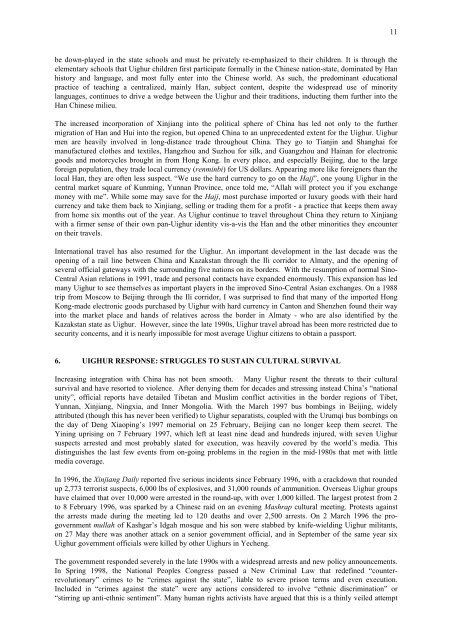Dru C. Gladney, Ph.D. - House Foreign Affairs Committee Democrats
Dru C. Gladney, Ph.D. - House Foreign Affairs Committee Democrats
Dru C. Gladney, Ph.D. - House Foreign Affairs Committee Democrats
Create successful ePaper yourself
Turn your PDF publications into a flip-book with our unique Google optimized e-Paper software.
11<br />
be down-played in the state schools and must be privately re-emphasized to their children. It is through the<br />
elementary schools that Uighur children first participate formally in the Chinese nation-state, dominated by Han<br />
history and language, and most fully enter into the Chinese world. As such, the predominant educational<br />
practice of teaching a centralized, mainly Han, subject content, despite the widespread use of minority<br />
languages, continues to drive a wedge between the Uighur and their traditions, inducting them further into the<br />
Han Chinese milieu.<br />
The increased incorporation of Xinjiang into the political sphere of China has led not only to the further<br />
migration of Han and Hui into the region, but opened China to an unprecedented extent for the Uighur. Uighur<br />
men are heavily involved in long-distance trade throughout China. They go to Tianjin and Shanghai for<br />
manufactured clothes and textiles, Hangzhou and Suzhou for silk, and Guangzhou and Hainan for electronic<br />
goods and motorcycles brought in from Hong Kong. In every place, and especially Beijing, due to the large<br />
foreign population, they trade local currency (renminbi) for US dollars. Appearing more like foreigners than the<br />
local Han, they are often less suspect. “We use the hard currency to go on the Hajj”, one young Uighur in the<br />
central market square of Kunming, Yunnan Province, once told me, “Allah will protect you if you exchange<br />
money with me”. While some may save for the Hajj, most purchase imported or luxury goods with their hard<br />
currency and take them back to Xinjiang, selling or trading them for a profit - a practice that keeps them away<br />
from home six months out of the year. As Uighur continue to travel throughout China they return to Xinjiang<br />
with a firmer sense of their own pan-Uighur identity vis-a-vis the Han and the other minorities they encounter<br />
on their travels.<br />
International travel has also resumed for the Uighur. An important development in the last decade was the<br />
opening of a rail line between China and Kazakstan through the Ili corridor to Almaty, and the opening of<br />
several official gateways with the surrounding five nations on its borders. With the resumption of normal Sino-<br />
Central Asian relations in 1991, trade and personal contacts have expanded enormously. This expansion has led<br />
many Uighur to see themselves as important players in the improved Sino-Central Asian exchanges. On a 1988<br />
trip from Moscow to Beijing through the Ili corridor, I was surprised to find that many of the imported Hong<br />
Kong-made electronic goods purchased by Uighur with hard currency in Canton and Shenzhen found their way<br />
into the market place and hands of relatives across the border in Almaty - who are also identified by the<br />
Kazakstan state as Uighur. However, since the late 1990s, Uighur travel abroad has been more restricted due to<br />
security concerns, and it is nearly impossible for most average Uighur citizens to obtain a passport.<br />
6. UIGHUR RESPONSE: STRUGGLES TO SUSTAIN CULTURAL SURVIVAL<br />
Increasing integration with China has not been smooth. Many Uighur resent the threats to their cultural<br />
survival and have resorted to violence. After denying them for decades and stressing instead China’s “national<br />
unity”, official reports have detailed Tibetan and Muslim conflict activities in the border regions of Tibet,<br />
Yunnan, Xinjiang, Ningxia, and Inner Mongolia. With the March 1997 bus bombings in Beijing, widely<br />
attributed (though this has never been verified) to Uighur separatists, coupled with the Urumqi bus bombings on<br />
the day of Deng Xiaoping’s 1997 memorial on 25 February, Beijing can no longer keep them secret. The<br />
Yining uprising on 7 February 1997, which left at least nine dead and hundreds injured, with seven Uighur<br />
suspects arrested and most probably slated for execution, was heavily covered by the world’s media. This<br />
distinguishes the last few events from on-going problems in the region in the mid-1980s that met with little<br />
media coverage.<br />
In 1996, the Xinjiang Daily reported five serious incidents since February 1996, with a crackdown that rounded<br />
up 2,773 terrorist suspects, 6,000 lbs of explosives, and 31,000 rounds of ammunition. Overseas Uighur groups<br />
have claimed that over 10,000 were arrested in the round-up, with over 1,000 killed. The largest protest from 2<br />
to 8 February 1996, was sparked by a Chinese raid on an evening Mashrap cultural meeting. Protests against<br />
the arrests made during the meeting led to 120 deaths and over 2,500 arrests. On 2 March 1996 the progovernment<br />
mullah of Kashgar’s Idgah mosque and his son were stabbed by knife-wielding Uighur militants,<br />
on 27 May there was another attack on a senior government official, and in September of the same year six<br />
Uighur government officials were killed by other Uighurs in Yecheng.<br />
The government responded severely in the late 1990s with a widespread arrests and new policy announcements.<br />
In Spring 1998, the National Peoples Congress passed a New Criminal Law that redefined “counterrevolutionary”<br />
crimes to be “crimes against the state”, liable to severe prison terms and even execution.<br />
Included in “crimes against the state” were any actions considered to involve “ethnic discrimination” or<br />
“stirring up anti-ethnic sentiment”. Many human rights activists have argued that this is a thinly veiled attempt











![Transcript [PDF] - House Foreign Affairs Committee Democrats](https://img.yumpu.com/34524080/1/190x245/transcript-pdf-house-foreign-affairs-committee-democrats.jpg?quality=85)



